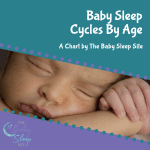
Babies need a lot of sleep! But how much exactly at each age? Babies need 10-12 hours of sleep at night and 2-4 hours during the day for most of their first two years. However, how sleep is broken down will vary by age. This post will teach you how much sleep your baby likely needs. Plus we’ll share tips for how to make sure your baby gets enough sleep.
How Much Sleep Do Newborns Need?
Newborns sleep a total of 16 hours a day in various length fragments. Most newborns will only sleep 8-10 hours at night but in 2-3-hour chunks. They also need to eat every 2-3 hours. For this reason, most newborn babies will need a late bedtime until they increase their nighttime sleep.
And, while some naps during the day might be 1-2 hours, some naps will be short 30-45 minutes. Most newborns can’t stay awake very long during the day so they have to sleep frequently. But, every nap can’t be long and luxurious! Otherwise, they would be up half the night! No one wants that, of course.
You May Also Be Interested In…
How Much Sleep Do Babies Need?
Babies between 3 and 5 months old need 10-12 hours of sleep at night and 3-4 hours during the day, on average. And, babies 6+ months old typically need 10-12 hours of sleep at night and 2-3 hours during the day.
Keep in mind that because these are averages, some babies will naturally fall above this number and some will fall below. Those who fall below average in the amount of sleep they need tend to be more active and observant babies though not always.
These schedules are usually the most challenging and it will be harder to follow the “textbook” schedules out there. If you aren’t sure if your baby falls above or below the averages, you may want to log your baby’s sleep for 1-2 weeks. The total amount will stay relatively constant unless you have other sleep problems.
You May Also Be Interested In…
How Much Sleep Do Babies Need: Chart By Age
| Age | # of Naps | Avg Daytime Sleep | Avg Night Sleep | Avg Total Sleep | Notes |
|---|---|---|---|---|---|
| 0 – 8 Weeks | 6-8 Naps | 4-6 hours | 8-11 hours | 15-17 hours | Sleep is erratic at this age. 0-8 week olds tend to sleep “anywhere” much of the time. Focus on daily feeding and sleep routines, and use those to shape your day. |
| 9 – 12 Weeks | 4-5 Naps | 3-5 hours | 9-11 hours | 14-16 hours | Sleep often begins to organize around this age. Many babies even start to sleep through the night (using the technical definition of 5+ hours a stretch). |
| 3 – 4 Months | 4-5 Naps | 3-4 hours | 10-12 hours | 14 hours | Watch for the 4 month sleep regression right around this time. It will throw off even the best sleeper! |
| 5 – 6 Months | 3-4 Naps | 2.5-3.5 hours | 11-12 hours | 14 hours | Short naps are normal in the first 5-6 months of your baby’s life. At around 6 months, your baby’s daytime sleep should start to consolidate into more predictable, regular naps. |
| 7-8 Months | 2-3 Naps | 2-3 hours | 10-12 hours | 14 hours | Another sleep regression strikes at around 8 or 9 months, and a nap transition sometimes happens around this same time: From 3 naps to 2. |
| 9 – 12 Months | 2 Naps | 2-3 hours | 11-12 hours | 14 hours | Once the 8-9-10 sleep regression is over, your baby’s schedule will likely be more predictable. You can consider night-weaning if you haven’t already done so. |
| 13-17 Months | 1-2 Naps | 2-3 hours | 10-12 hours | 13-14 hours | Resist the impulse to transition to 1 nap when your baby turns 12 months old. Most babies don’t make the transition to 1 nap until closer to 15-18 months. Hang on to that second nap as best you can for this stage! |
| 18 Months-3 Years | 1 Nap | 1-3 hours | 10-12 hours | 13-14 hours | Watch your toddler’s awake time between the end of the afternoon nap and bedtime. As your toddler grows, he’ll need longer and longer afternoon wake time. This means you’ll need to time the nap carefully to be sure it doesn’t push bedtime too late. Some children will drop their nap entirely before age 3, with the average being 3 to 4 years old. |
How Did We Make This Sleep Needs Chart?
The above chart is derived from over 15 years of experience as a sleep consultant, with thousands of families. We also used the following two books for reference:
Solve Your Child’s Sleep Problems by Dr. Richard Ferber
Healthy Sleep Habits, Happy Child by Dr. Marc Weissbluth M.D.
We strive to bring you practical information at your fingertips that you can put to use right away.








